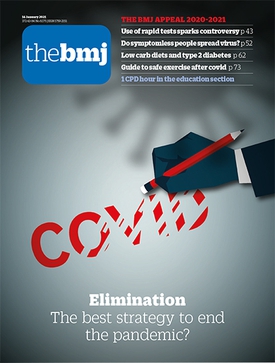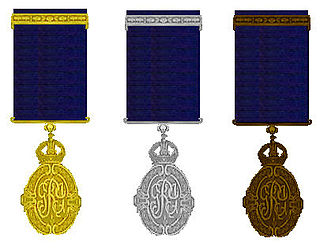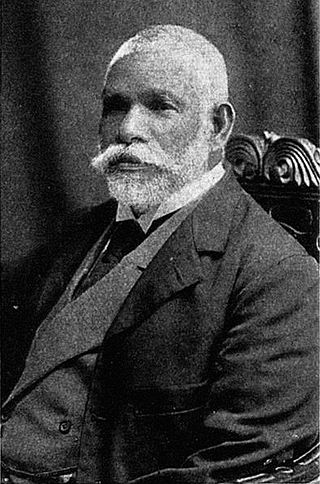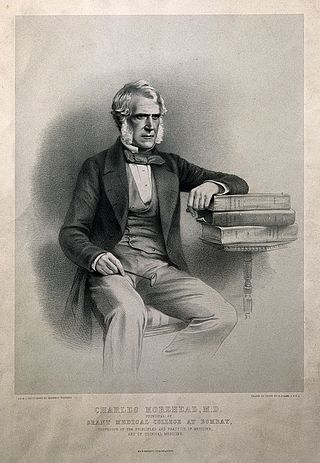
Turricephaly is a type of cephalic disorder where the head appears tall with a small length and width. It is due to premature closure of the coronal suture plus any other suture, like the lambdoid, or it may be used to describe the premature fusion of all sutures. It should be differentiated from Crouzon syndrome. Oxycephaly is a form of turricephaly where the head is cone-shaped, and is the most severe of the craniosynostoses.
PubMed is a free search engine accessing primarily the MEDLINE database of references and abstracts on life sciences and biomedical topics. The United States National Library of Medicine (NLM) at the National Institutes of Health maintain the database as part of the Entrez system of information retrieval.

The BMJ is a weekly peer-reviewed medical journal, published by BMJ Group, which in turn is wholly-owned by the British Medical Association (BMA). The BMJ has editorial freedom from the BMA. It is one of the world's oldest general medical journals. Previously called the British Medical Journal, the title was officially shortened to BMJ in 1988, and then changed to The BMJ in 2014. The journal is published by BMJ Publishing Group Ltd, a subsidiary of the British Medical Association (BMA). The current editor-in-chief of The BMJ is Kamran Abbasi, who was appointed in January 2022.

Arthur Charles Hamilton-Gordon, 1st Baron Stanmore was a British Liberal Party politician and colonial administrator. He had extensive contact with Prime Minister William Ewart Gladstone.

The Kaisar-i-Hind Medal for Public Service in India was a medal awarded by the Emperor/Empress of India between 1900 and 1947, to "any person without distinction of race, occupation, position, or sex ... who shall have distinguished himself by important and useful service in the advancement of the public interest in India."

Soorjo Coomar Goodeve Chuckerbutty, also spelled Surjo Kumar Chakraborty was the first Indian to pass the examination of the Indian Medical Service (IMS) in 1855 and subsequently became the Professor of Materia Medica at Calcutta Medical College (CMC) in the latter half of the nineteenth century.

Shigella boydii is a Gram-negative bacterium of the genus Shigella. Like other members of the genus, S. boydii is a nonmotile, nonsporeforming, rod-shaped bacterium which can cause dysentery in humans through fecal-oral contamination.

Sir Dominic John Corrigan, 1st Baronet, was an Irish physician, known for his original observations in heart disease. The abnormal "collapsing" pulse of aortic valve insufficiency is named Corrigan's pulse after him.

The Indian Medical Service (IMS) was a military medical service in British India, which also had some civilian functions. It served during the two World Wars, and remained in existence until the independence of India in 1947. Many of its officers, who were both British and Indian, served in civilian hospitals.

The Medical Society of London is one of the oldest surviving medical societies in the United Kingdom.

William Gabriel Rockwood was a Ceylon Tamil physician and member of the Legislative Council of Ceylon.
Alka Kriplani is an Indian gynecologist,medical writer and academic, known for her contributions to the fields of Reproductive Endocrinology and Gynaecological Endoscopy. She was professor and the Head of the Department of Gynecology and Obstetrics at the All India Institute of Medical Sciences, New Delhi. A recipient of the Dr. B. C. Roy Award in 2007, she was honoured by the Government of India in 2015 with Padma Shri, the fourth highest Indian civilian award.
The London Dialectical Society was a British professional association that formed in 1867 to encourage debate "of all questions without reserve, but especially those comprised in the domain of ethics, metaphysics, and theology". It is best known for its investigation into and report on the claims of spiritualism.

Charles Morehead CIE FRSE was a 19th-century Scottish physician who rose to eminence in the Indian Medical Service for his contribution to medical education. He was the founding principal of the Grant Medical College in Bombay in 1845.
David Boyes Smith was deputy surgeon general of the Indian Medical Service (IMS).
Alexander Crombie was a Scottish surgeon who joined the Indian Medical Service and became resident surgeon at Calcutta Medical College, India, where he became professor of materia medica.

Major Reginald Francis Edward Austin L.R.C.P., M.R.C.S. was a British physician, naturopath and anti-vaccination activist.
John Shortt was an Anglo-Indian physician who served in the Madras Presidency in southern India. He conducted research on snake venoms, wrote on a variety of other subjects including anthropology, agriculture, and animal husbandry. A species of shieldtail snake endemic to the Shevaroy Hills is named after him, Uropeltis shorttii.
Colonel Walter Gawen King was a British Indian army surgeon who served in the Madras Presidency as a sanitary officer and introduced a number of public health measures for the first time in India. The King Institute of Preventive Medicine and Research in Chennai was named in his honour in 1905.












